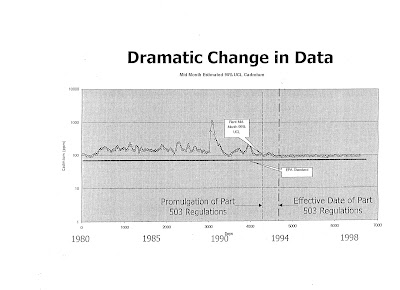A clip from our 1+ hour interview with Dr. David Lewis, a former senior research microbiologist with the U.S. Environmental Protection Agency’s Office of Research & Development.
Rachel Linden, GMO Free News: You wrote about your research being used in a lawsuit, and correct me if I get any of this wrong, by two families in Georgia that owned dairies that had previously used sewage sludge on their land and their cattle died. How many cattle and can you tell us the story of what happened with that?
Dr. David Lewis: In both cases it was two of the most productive dairy farms in the state of Georgia, had been in operation since the 1940's. Suddenly after the city of Augusta, Georgia talked these two farm families into spreading this free sewage sludge fertilizer on their farms their cattle started dying.
The cattle were getting infections, and in some cases rare infections the cattle didn't normally get. It's a story that I saw repeated across the country.
These toxic mixtures of heavy metals and toxic organic chemicals cause a depression of the immune system. We saw it in humans and animals.
And that's what was happening on these two dairy farms.
So, they were having to haul off the sick cows and replace them with healthy cows, but they couldn't keep up with it. It destroyed both dairy farms.
In the process, they hired expert veterinarians to come in and figure out what was going on. And what they found is that the liver and kidneys in these cattle were damaged from the cocktail of toxic organic chemicals and heavy metals that were in the sludge.
And what they discovered when they went back, they filed a lawsuit over this against the city, and one of the farmers filed a lawsuit against the USDA later on.
What they found in discovery is that, for one thing, in 1993, when the sewage treatment plant in Augusta and everywhere else, other sewage treatment plants, had to start following the EPA's 503 sludge rule for certain metals, that the historical data for over 20 years in Augusta look clean.
I mean it's amazing to look at the graph.
For decades they had high levels of cadmium in their sludge, high levels of molybdenum, high levels of other things, including organic things like chlordane, a banned pesticide. All of a sudden, all of that went away in February , but yet nothing was done to change anything at the waste treatment plant.
That happened at waste treatment plants across the country.
So we got into that and found out, and the plant manager at the waste treatment plant admitted when deposed under oath, he sat down at a computer when EPA came down to look at what was going on in Augusta and publish its own research paper on what was wrong with the cattle, when they arrived within a day or two, when EPA arrived in Augusta, Georgia, the plant manager in Augusta sat down and got rid of twenty years of data, created twenty --- created data on a computer to represent those years, that showed the heavy metals were far lower than they really were.
And all of the original data disappeared.
They disappeared at the University of Georgia, they disappeared at the state EPD, the Environmental Protection Division, in Atlanta, they disappeared at the federal EPA, and in the city of Augusta.
All of these original valid data disappeared and they published these fake data.
So EPA tried to cover up what happened in Augusta, the lawsuit was filed over it, it got into federal court when they sued the USDA. The USDA pulled out their own paper they published saying the levels of metals were fine, there was no problem there.
The federal judge in that case, Anthony Alaimo, a judge that was famous for fighting civil rights issues in the prisons, in fact there's a book about him out. He was the first judge to look at any of this situation and rule on it, and he ruled that EPA's testimony and USDA's data were not reliable because it was based on fabricated data.
And Judge Alaimo devoted several pages of his thirty-page ruling to how EPA suppressed my own research on this and other sites.
So that's the story of the dairy farms.
The British science journal Nature covered Judge Alaimo's ruling in an editorial calling for EPA to investigate and report toxic chemicals in sewage sludge and published a two page news article on the fake data.
The interesting thing about this issue is we have the scientific community behind us that something's got to be done about this problem, unlike other things where the pharmaceutical industry and
the chemical industry has gotten the upper hand ahead of us on issues where we've got the government suppressing research and data and putting out misinformation.
This is not one of those areas. We have the scientific community at large behind us to do something about this problem.
Resource Links:

No comments:
Post a Comment